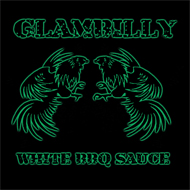


What’s in a name? With the band Glambilly, exactly what it says: Music with genuine roots that truly rocks with balls, flash, sass and style. Hailed by the Austin Chronicle as “wicked cool” and “pure rock-roots, not the other way around,” the San Antonio, Texas trio rip it up righteously and seamlessly mix myriad musical styles on White BBQ Sauce, their third album and Saustex Media label debut.
Such compelling qualities and much more can be found in the tasty musical concoction that Glambilly slathers all over the 11 tracks of White BBQ Sauce. Led by singer, songwriter, bassist, award winning playwright and screenwriter Hans Frank, the band creates old school-based music for the 21st Century and beyond.
Opening with a pummeling blast on the rural rube meets the urban monster tale of “City of Angels (Dumb Ol’ Country Boy),” the album serves up metallic blues on the title track, gets mechanistically modernist on “So Much Better Than Hans,” and makes the obligatory acoustic love song into something deliciously perverse on “Apt. 7902.” Whether it’s the lusty classic hard rock romp of “Bite The Bed,” the satanic stomp of “I Must Be The Devil” or the pummeling death knell of “Body In Plastic,” White BBQ Sauce defies today’s trendy musical conformity with delinquent delight. It also updates and further energizes the sizzling lament “Memories” and the transformation of the Bob Wills & His Texas Playboys Western swing classic “Stay A Little Longer” into a stomping barroom rocker that were first heard along with “City of Angels” on the 2005 major label country album by Frank’s former band 10 City Run.
White BBQ Sauce includes a lurid spoken word interlude, “Pablo,” and closes with the tense guitar-laced swirl of “Firefly.” Guitarist “Dangerous” Danny Aaron from Texas hard rock heroes Dangerous Toys spikes the set with six-string fire and fury while drummer Tony Gloria stomps up a rhythmic tempest on a disc that steamrolls down the barriers between genres and roots influences to offer an 11-track blast of genuine style-straddling rock’n’roll that’s as potent and undeniable as a punch to the gut.
Frank boasts real deal hillbilly credentials thanks to his birth and formative years in Meigs County, Ohio in the Appalachian hills where the Buckeye State merges with Kentucky and West Virginia. So it’s no wonder that his musical creativity reflects a similar rebel spirit to such locally bred country talents as Johnny Paycheck, David Allan Coe and Bobby Bare as well as a keen-eyed wit not unlike that of acclaimed American literary satirist Ambrose Bierce, who also hailed from Meigs County.
Traditional country and bluegrass were essential elements within the home and milieu into which Frank came of consciousness. As well, “The first 3 songs that I remember being cognizant of were ‘Hound Dog,’ ‘Rhinestone Cowboy’ and ‘Hit The Road Jack,’” he notes. Add in piano lessons at age nine followed by taking up the guitar, the Jimi Hendrix albums his aunt gave Frank when he was 14, and then his skatepunk years blasting Black Flag, Agent Orange and The Ramones, and the notion of Glambilly starts to be the logical conclusion of Frank’s developing life.
Then in a Quaker boarding school for his last years of high school Frank began digging on Chet Baker and Sun Ra, and became a fan of the band NRBQ. “That was when I began to get into artists who weren’t afraid to make music that was an amalgam of styles,” Frank explains.
While earning his college degree in theatre and film at Ohio University, Frank played in a rockabilly band, and well before the revivalist style descended into a retro fashion trend. He also wrote and produced a film with a friend that was primed to hit screens nationally until his fellow Southeast Ohio musical hillbilly Dwight Yoakam’s movie directing debut bankrupted the distribution company. But hearing The LeRoi Brothers from Austin, TX hinted to Frank that his creative fate might lay elsewhere.
He hit the Lone Star State to start his advanced degree studies in theater at Texas Tech and then finished them at the University of Alabama to earn an MFA in playwrighting and dramaturgy. Frank then followed a girlfriend to San Antonio and soon got dumped, found work as a college professor, and became enthralled with the genre blending legacy of Alamo City native and Texas legend Doug Sahm.
A short play he wrote that won a prize in Austin’s Frontera Fest was commissioned as a full theatre piece, Lonely Highway, which transmuted Italian commedia dell'arte into a hillbilly minstrel show and won two Austin Critics Circle awards. The band that accompanied Frank in his one man play during its two year run in the Capital City carried on as his country group 10 City Run that spent the next three years “playing every dangerous joint that no other band would play” in the Texas Hill Country.
Just as 10 City Run was about to sputter out of gas, their tank was refilled by winning a contest that earned them the prize of a major label Nashville record deal with Universal South Records. The band made an album, Somethin’ Else, which was indeed just that in all the best ways, presenting an appealing alternative to both mainstream country and Americana. The label didn’t get it even if a small and still devoted cult of those with attuned ears and canny tastes did, and the band’s award winning video for “City of Angels (Dumb Ol’ Country Boy)” earned major national TV exposure as the single racked up satellite, Internet and terrestrial radio play.
10 City Run ended its course on a high note when the band appeared at The Ryman Auditorium in Nashville opening for Ray Price. “It was a 30 year journey to get to what was the stage of the Grand Ole Opry in its heyday,” Frank notes. “I looked at Ray Price, who was 80 years old, and the audience who weren’t much younger, and realized that the culture that had sustained a need for this music is dying off, and what was country music has been replaced by a more watered-down version, culturally speaking. And I had a sense with a lot of Americana and alterative country that people had an appreciation of the music but not a more nuanced and profound understanding of the culture that created it. It all rang hollow to me and I didn’t want to be a part of it anymore. It was kind of done and over, I thought.”
After such an epiphany, what else could a poor boy do but start and play in a rock’n’roll band? He first did so as Hans Frank and the Auslanders, who recorded a live album at Austin’s Saxon pub. However, “The name was too long to fit on marquees, and everyone thought we were from Germany,” he explains.
But the moniker Glambilly was instead short, sweet and said it all for Frank, whose sense of musical breadth that runs “from Bill Monroe to the New York Dolls” all easily fell under the rubric. Two smoking slabs of music under the name preceded White BBQ, one of which prompted Texas Music magazine to rave, “Think Johnny Cash hopped up on pills and simultaneously carjacking both ZZ Top and White Zombie.”
Over that time the band included such noted players as Pete Mitchell, onetime guitarist with Ernest Tubb & The Texas Troubadours, and drummer Bobby Natanson, who frequently appeared on The Ed Sullivan Show and The Dean Martin Show as a member of The Swingin’ Lads and also played with such renowned artists as T-Bone Walker and Gabor Szabo. Austin country-rock and master twang guitarist Casper Rawls, whose many credits include playing with Frank’s favorites The LeRoi Brothers, also graced Glambilly with his six-string mastery.
Now stripped down and focused into a raucously rocking threesome, Glambilly make their third time on record the charm with White BBQ Sauce. Proving that roots music doesn’t have to be drab and glam can add some sparkle to thundering twang, the band is forging an original and scintillating new iteration of real American music. As Texas Music Times notes, “On a scale of 1 to 10, Glambilly goes to 11.” Tune in, turn on, and rock out.

GLAMBILLY
"WHITE BBQ SAUCE" CD
$10 + S & H